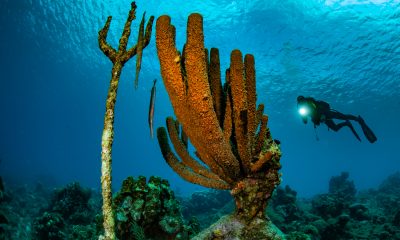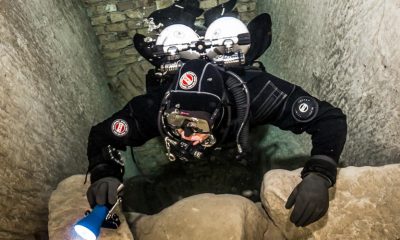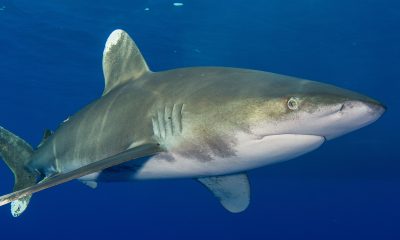Marine Life & Conservation
Pandemic causes a surge in interest in Green Fins Dominican Republic
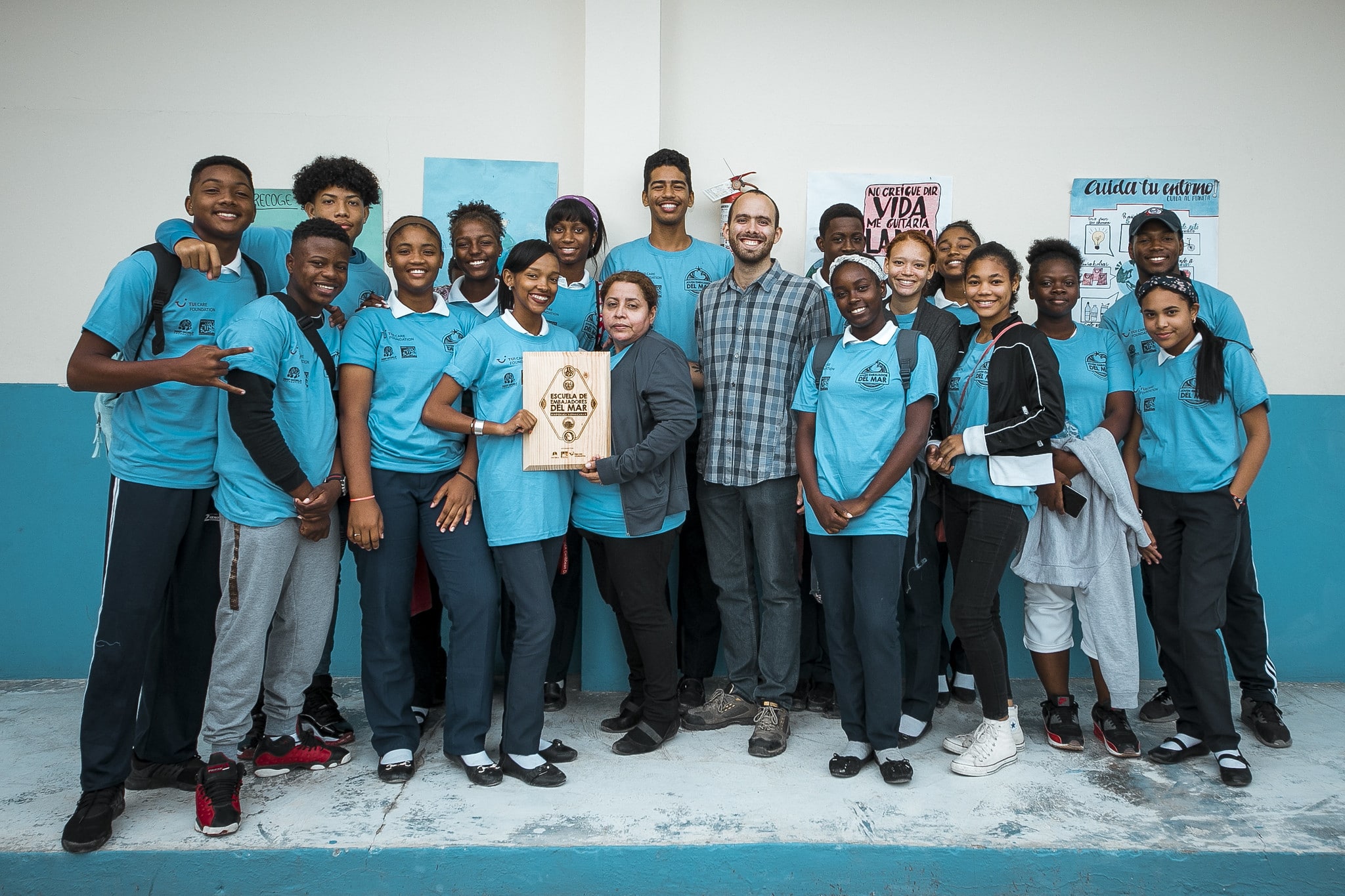
Going digital is helping to boost the programme’s conservation impact
The Reef-World Foundation – international coordinator of the UN Environment Programme’s Green Fins initiative – and Reef Check Dominican Republic have adapted to the new situations caused by the pandemic in order to reach even more dive and snorkel operators with their conservation messaging.
The COVID-19 pandemic has caused major disruption for the global travel industry and resulted in environmental concerns; for example, through the increased use of single-use plastic items such as gloves and masks. However, for the Green Fins initiative in the Dominican Republic, the pandemic has also brought some positive conservation effects, such as coastal water quality improvements due to the drastic reduction on human activities.
Green Fins Dominican Republic receives a surge of interest
At the onset of the outbreak in March 2020, tourism activities came to an abrupt halt which meant all Green Fins activities and assessments had to be put on hold. Despite this, there was a surge in interest from dive centres in the Dominican Republic wanting to join Green Fins. Plans are underway to conduct training and assessments of these businesses once they are fully operational again.
Tourism businesses have been operating at around 30% capacity since July; however, with plans for many of the hotels and resorts to open even further for high season in November 2020, Green Fins assessments could be underway again by the end of the year. Moving the programme’s environmental awareness raising sessions from in-person to online has helped significantly increase the number of people reached: from dozens to hundreds.
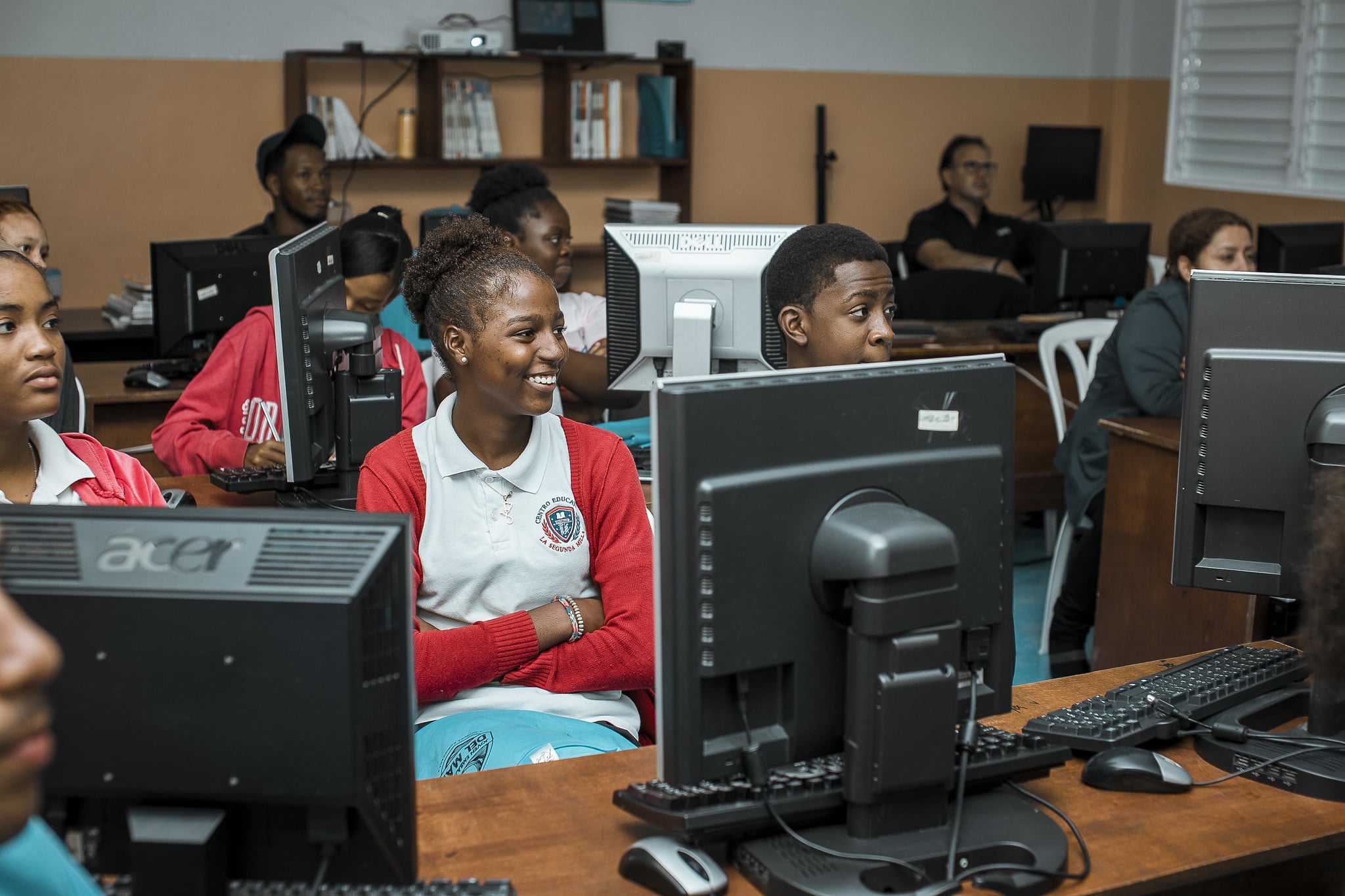
Marine conservation lessons in the Dominican Republic
Government of Dominican Republic shows ongoing programme support
In August 2020, a new President (Mr. Luis Abinader) was elected and came into office and a new Minister of Environment and Natural Resources (Mr Orlando Jorge Mera) was appointed. There has been overwhelming support for the Green Fins initiative and the Youth Ambassador programme from the new officials. In addition, a new law in the Dominican Republic mandates the inclusion of environmental education in all levels of the national education curriculum; making the Green Fins content even more relevant.
TUI Junior Academy determined to continue providing conservation education for children
In January 2020, Reef-World and the TUI Care Foundation launched a new TUI Junior Academy to support environmental training and inspire a generation of Youth Ambassadors for coral reef conservation. A state of emergency was declared in Dominican Republic just months later (16 March 2020) with measures such as curfews, border closures and school cancellations being enforced for several weeks. As a result of these measures, planned delivery of the Youth Ambassador curriculum (including marine conservation lectures and field activities) for the Youth Ambassadors were put on hold immediately.
The Green Fins team has worked hard to adapt to the current situation and reach the children. Due to restrictions on large gatherings, in-person solutions – such as reaching the children through community groups and local churches – are no longer possible. Instead, projects that the children can be involved with in an independent manner – such as home plastic detective projects and making reusable masks and environmentally friendly soap – will replace the beach cleanups, workshops and community art projects that were originally due to take place.
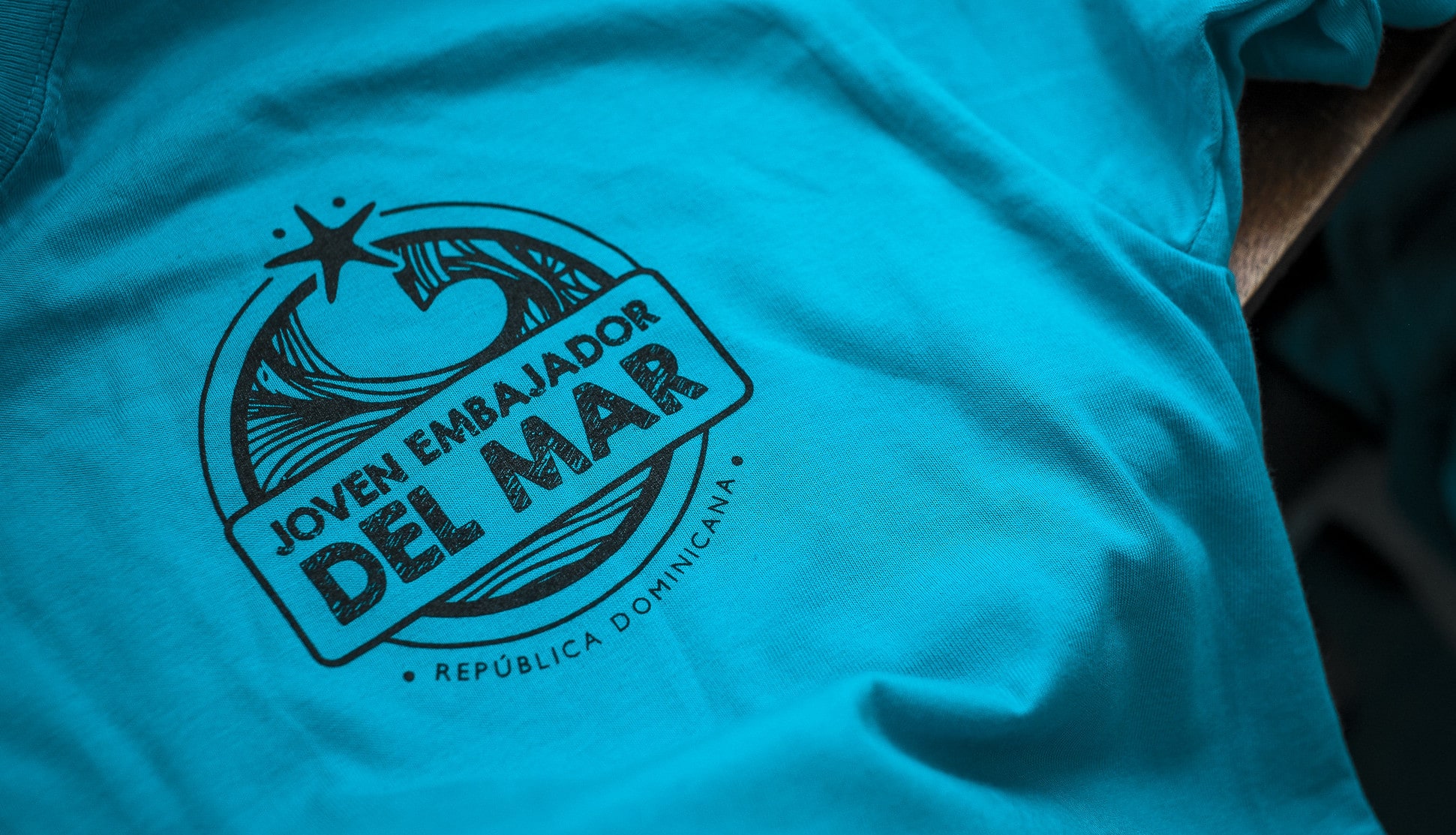
Youth Ambassador’s T-shirt
In collaboration with the Direction of Education within the Ministry of Environment, the team started to deliver educational marine conservation content to children using digital platforms. However, many children currently do not have access to a computer, tablet or the internet which makes this solution challenging at present. The new government has pledged to help install internet access and provide children with access via computers and tablets which will help resolve this challenge and reach an even greater public.
The Education Department within the Ministry of Environment is keen to continue education for all school aged children in the Dominican Republic. As part of this, they have requested Reef Check and Reef-World partner with them to deliver the Green Fins curriculum to children across the country via webcam. Five daily 40-minute lessons about the marine environment are now being delivered for approximately 500 children.
Ruben E. Torres, Ph.D., Reef Check Dominican Republic, said: “Being forced to go online with our activities has helped us reach out to many more people than planned. We recently reached over 150 people in a single afternoon using Zoom® compared to a few dozen over a couple of weeks when we ran in person training sessions some months ago.”
JJ Harvey, Director at The Reef-World Foundation, said: “It’s great to see interest in Green Fins is stronger than ever in the Dominican Republic. It’s unknown exactly why we’ve seen such a surge in interest recently. However, with sustainability key to the travel industry bouncing back, we believe marine tourism operators are looking to gain a competitive edge by obtaining Green Fins environmental certification. Reef-World has noticed this trend globally – not just in the Dominican Republic – as businesses look to improve their chances of surviving a potential financial shortfall in the coming months and years. We’re delighted to see the programme continuing to have a tangible conservation impact despite current disruptions and we welcome enquiries from other interested dive and snorkel operators.”
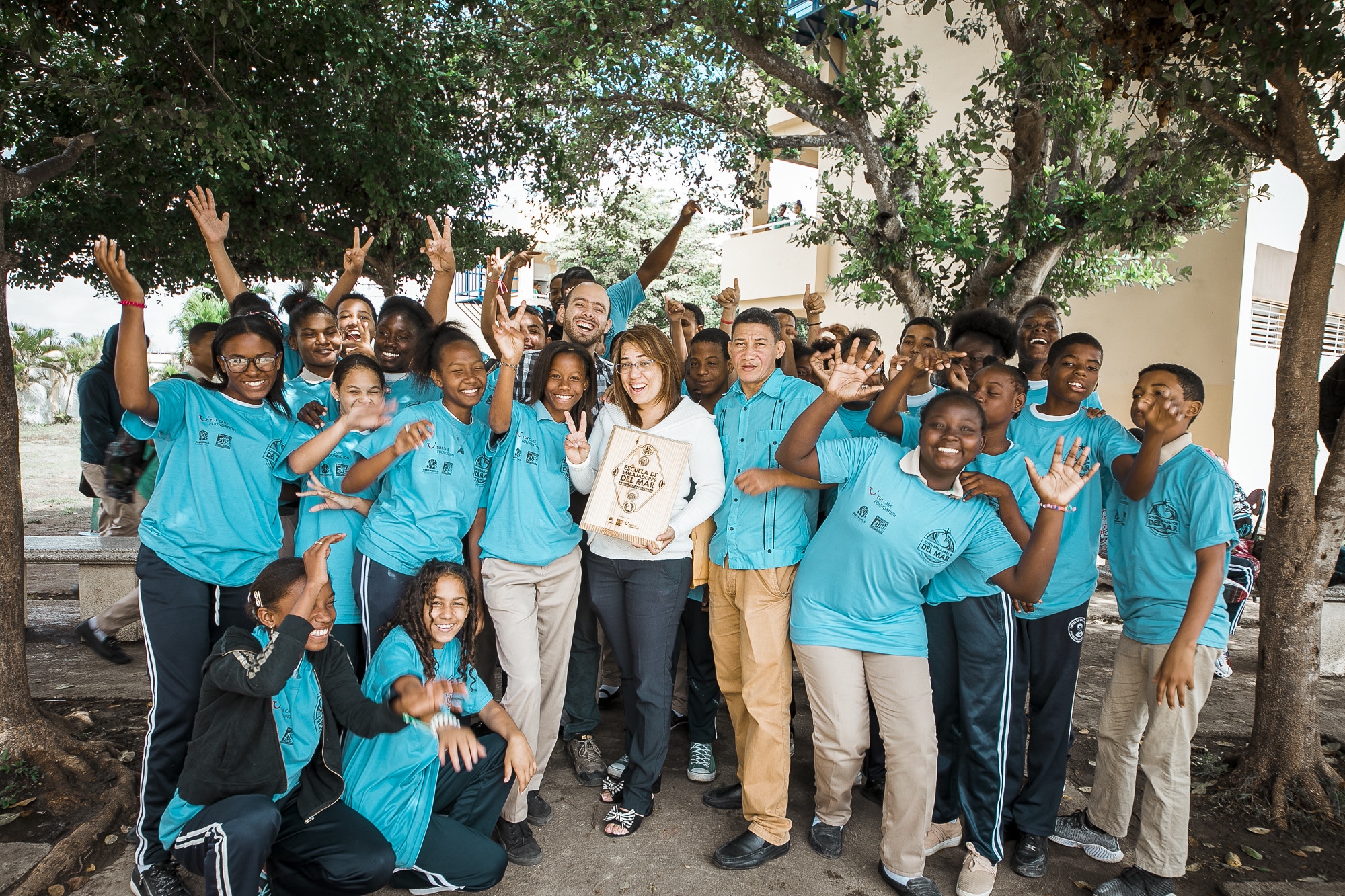
Youth Ambassadors in the Dominican Republic
Orlando Jorge Mera, Minister of Environment and Natural Resources of the Dominican Republic, said: “Addressing the environmental issues such as the climate change and the pollution of our oceans, this administration’s agenda has environmental education as a priority. We want to imprint a legacy by educating future generations. We need to raise awareness as a society. It is not just about who occupies the Ministry of the Environment, it is a legal and moral commitment, this is everyone’s job. We thank the REEF World Foundation, Reef Check Dominican Republic, TUI Care Foundation and TUI Junior Academy for promoting environmentally friendly initiatives in favor of the Dominican Republic. Education can’t stop. Count on us!”
Green Fins Dominican Republic was established in June 2018 with support from the Regional Activity Centre for the Protocol on Specially Protected Areas and Wildlife (SPAW-RAC). The initiative is overseen and managed in the country by Reef Check Dominican Republic in collaboration with the Ministry of Environment and Natural Resources and the Auxiliary Navy. Further expansion is being supported through the TUI Care Foundation.
For more information, please visit www.greenfins.net
Marine Life & Conservation
Double Bubble for Basking Sharks

 The Shark Trust is excited to announce that, for two more days only, all donations, large or small, will be doubled in the Big Give Green Match Fund!
The Shark Trust is excited to announce that, for two more days only, all donations, large or small, will be doubled in the Big Give Green Match Fund!
Donate to Basking in Nature: Sighting Giants
The Shark Trust is hoping to raise £10k which will be doubled to £20k. This will go towards Basking in Nature: Sighting Giants. And they need YOUR help to reach they’re goal.
The Shark Trust’s citizen science project is to monitor and assess basking sharks through sightings; encouraging data collection, community engagement, and promoting nature accessibility. This initiative aims to enhance health and wellbeing by fostering a deeper connection with British Sharks.
Campaign Aims
- Increase citizen science reporting of Basking Sharks and other shark sightings to help inform shark and ray conservation.
- Provide educational talks about the diverse range of sharks and rays in British waters and accessible identification guides!
- Create engaging and fun information panels on how to ID the amazing sharks and rays we have on our doorstep! These can be used on coastal paths around the Southwest. With activities and information on how you can make a difference for sharks and rays!
- Promote mental wellbeing through increasing time in nature and discovering the wonders beneath the waves!
Donate, and double your impact. Click Here
Marine Life & Conservation
Leading UK-based shark conservation charity, the Shark Trust, is delighted to announce tour operator Diverse Travel as a Corporate Patron

 Corporate Patrons provide a valuable boost to the work of The Shark Trust. The Trust team works globally to safeguard the future of sharks, and their close cousins, the skates and rays, engaging with a global network of scientists, policymakers, conservation professionals, businesses and supporters to further shark conservation.
Corporate Patrons provide a valuable boost to the work of The Shark Trust. The Trust team works globally to safeguard the future of sharks, and their close cousins, the skates and rays, engaging with a global network of scientists, policymakers, conservation professionals, businesses and supporters to further shark conservation.
Specialist tour operator Diverse Travel has operated since 2014 and is committed to offering its guests high quality, sustainable scuba diving holidays worldwide. Working together with the Shark Trust will enable both organisations to widen engagement and encourage divers and snorkellers to actively get involved in shark conservation.
“Sharks are truly at the heart of every diver and at Diverse Travel, we absolutely share that passion. There is nothing like seeing a shark in the wild – it’s a moment that stays with you forever!” says Holly Bredin, Sales & Marketing Manager, Diverse Travel.
“We’re delighted to celebrate our 10th year of business by becoming a Corporate Patron of the Shark Trust. This is an exciting partnership for Diverse and our guests. We will be donating on behalf of every person who books a holiday with us to contribute towards their vital shark conservation initiatives around the world. We will also be working together with the Trust to inspire divers, snorkellers and other travellers to take an active role – at home and abroad – in citizen science projects and other activities.”
Paul Cox, CEO of The Shark Trust, said:
“It’s an exciting partnership and we’re thrilled to be working with Diverse Travel to enable more divers and travellers to get involved with sharks and shark conservation. Sharks face considerable conservation challenges but, through collaboration and collective action, we can secure a brighter future for sharks and their ocean home. This new partnership takes us one more valuable step towards that goal.”
For more information about the Shark Trust visit their website here.
For more about Diverse Travel click here.
-

 News3 months ago
News3 months agoHone your underwater photography skills with Alphamarine Photography at Red Sea Diving Safari in March
-

 News3 months ago
News3 months agoCapturing Critters in Lembeh Underwater Photography Workshop 2024: Event Roundup
-

 Marine Life & Conservation Blogs2 months ago
Marine Life & Conservation Blogs2 months agoCreature Feature: Swell Sharks
-

 Blogs2 months ago
Blogs2 months agoMurex Resorts: Passport to Paradise!
-

 Blogs2 months ago
Blogs2 months agoDiver Discovering Whale Skeletons Beneath Ice Judged World’s Best Underwater Photograph
-

 Gear Reviews3 months ago
Gear Reviews3 months agoGear Review: Oceanic+ Dive Housing for iPhone
-

 Marine Life & Conservation2 months ago
Marine Life & Conservation2 months agoSave the Manatee Club launches brand new webcams at Silver Springs State Park, Florida
-

 News3 months ago
News3 months agoWorld’s Best Underwater Photographers Unveil Breathtaking Images at World Shootout 2023









